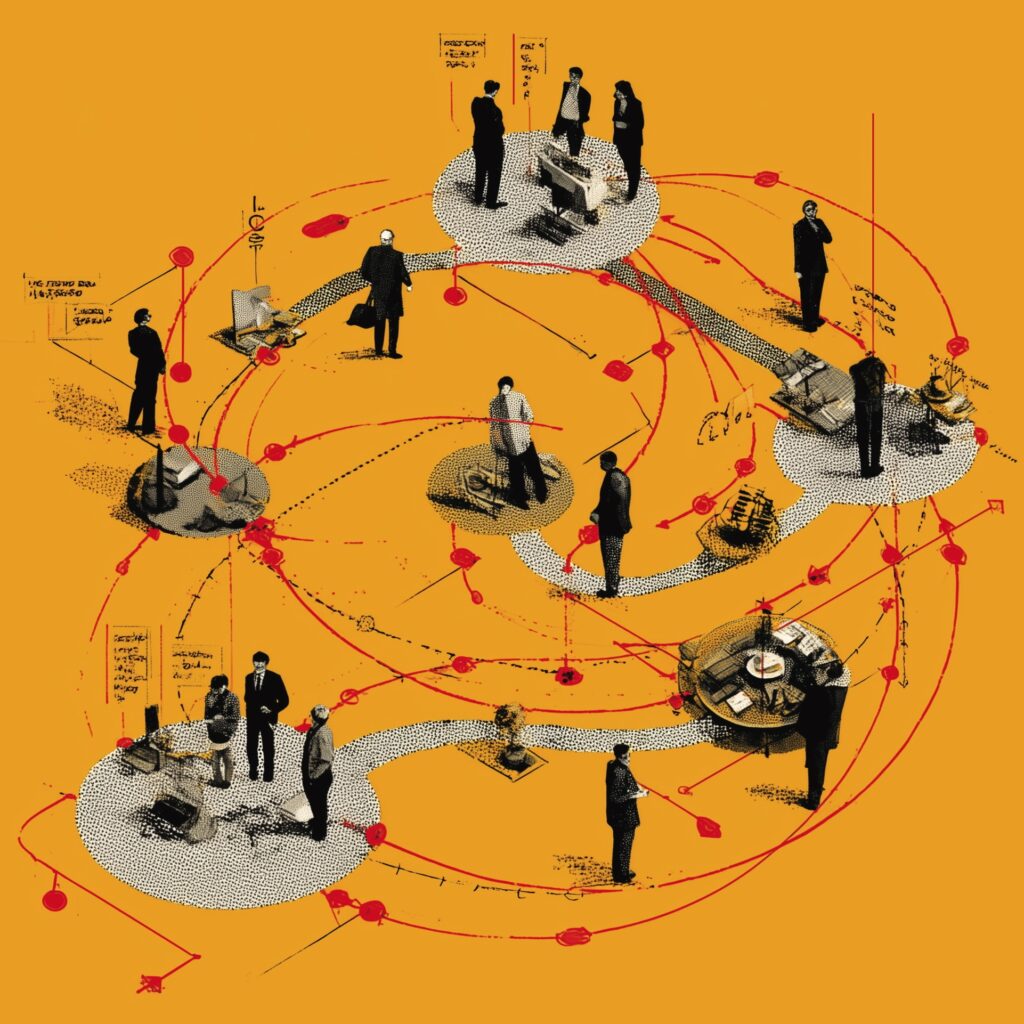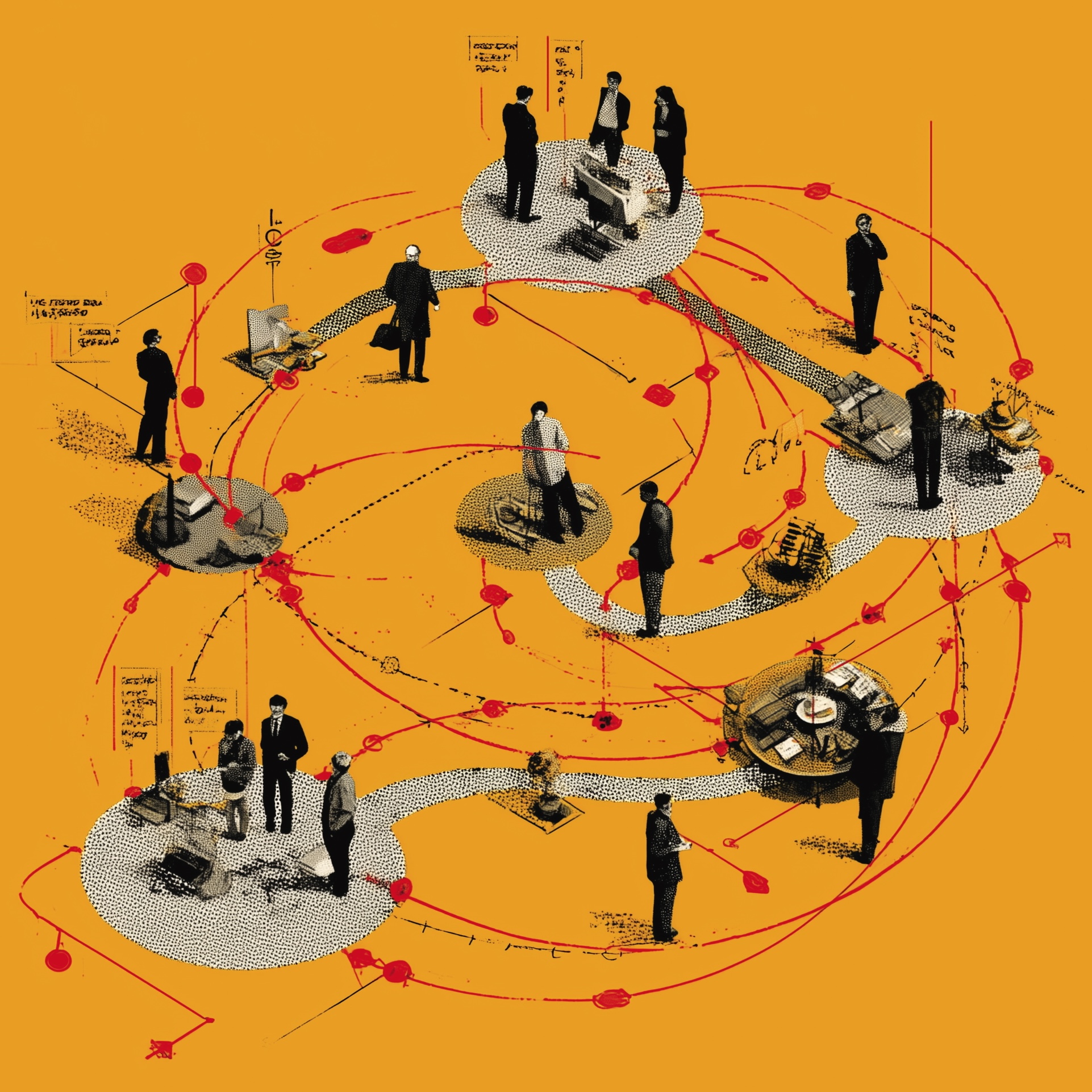We get knocked down. We get up again.
With its brutal NHS cuts and chaotic reform plans, the government is moving fast and breaking things (again). It will be up to managers to fix them (again), writes Geoff Underwood.

Chirp! Buzz!
I’m distracted from something I should be doing by a notification on my phone: “Here’s a memory from 2012!” It’s my photos app, surfacing a video from what feels like a long time ago. Of course I watch it immediately.
INT. A SITTING ROOM – DAYTIME
In the foreground, an adult hand starts to build a tower with toy blocks on the floor. At the back of the room a happy toddler spies the tower and locks on. Shambling across the carpet, they smash the tower with glee and wobble away delighted. The adult starts to rebuild the tower and makes some progress before the toddler notices and smashes it down again. And again. And again.
FADE TO BLACK
Here’s another memory from 2012. In March, Andrew Lansley’s Health And Social Care Act received royal assent. Remember that one? It’s the one where the coalition government, having said they would “stop the top-down reorganisations of the NHS that get in the way of patient care”, kicked off the biggest top-down reorganisation of all time.
I’m about to start a sentence with words I thought I would never put together in my mind, let alone in print.
To be fair to Andrew Lansley (relax brow, unclench jaw), it’s easy to forget that the changes that were formalised in 2012 followed almost two years of consultation and planning. There was the Liberating The NHS white paper in July 2010, the first Health and Social Care Bill in January 2011, the “pause for listening” in April after a serious backlash, and a revised bill with more than a thousand amendments in September, before, ultimately, the bill became the act in March 2012. There’s so much to criticise about those reforms, but you can argue that form followed function. They had a plan.
Out of nowhere
Chirp! Ping!
It’s March 2025 and I’m distracted from something I should be doing by a message on my laptop. It’s from a fellow MiP rep: “Have you seen this??!”, with a link to a video. Of course I watch it immediately.
INT. ATRIUM OF A LIFE SCIENCES COMPANY HQ – DAYTIME
In the foreground, the prime minister wanders to and fro, sleeves rolled up, talking about democratic control and cutting bureaucracy. (Looking back now, I wonder if his team suggested brandishing a chainsaw.) After a long preamble he finally gets across the carpet to the tower of blocks. Out of nowhere, without consultation and, as is becoming more and more apparent, without much thought, he knocks them over: NHS England will be abolished, he announces, and over 13,000 public servants in “the world’s biggest quango” (™ Wes Streeting) will be tossed casually under the bus, on top of swingeing cuts to ICBs and trusts.
FADE TO BLACK
This is a Labour government. The prime minister is Sir Keir Starmer, a man knighted for his work leading thousands of public servants at the Crown Prosecution Service. When he made that announcement on live television, he would have known, not only how union members would react, but the impact it would have on the motivation and morale of thousands of public servants. I’m not just disappointed, I’m angry.
Doing damage now
I’ve been hearing from managers across the NHS about the impact this reorganisation is already having, when—and, in large part, because—months later we’re not much clearer on what any of this means.
But the impact on individuals—now—is real.
This from an ICB manager in the north of England: “We’re tired. We’re really, really mentally drained. We’re still doing our best, but I’ll be honest, it’s absolutely dire.”
And from a head of Workforce programmes: “I’m absolutely physically and mentally exhausted. I’m not sleeping. I have a mortgage and bills to pay on my own. I have a roof to keep over my head and no real indication of where I’ll be in six months.”
The impact on health service delivery and productivity—now—is real too.
A lead for business intelligence at a south-west ICB told me: “Me and my team haven’t touched our day jobs in the last week. We haven’t had time, we’ve just been responding to all of this.”
And the head of medicines optimisation for an ICB said, “We’re losing members of our teams. I have a small team and one has handed their notice in already, citing the changes as the only reason for wishing to leave. It’s making a hard job even harder.”
Chaos and distraction
In May, a friend of mine broke her knee while running in a field. She waited in the field, in agony and unable to move, for five hours before a paramedic in a fast response vehicle recommended hauling her into her own car so her husband could drive her to hospital. No stretcher, no two-person crew to lift her safely, just plenty of gas and air to deal with the pain. She needed surgery but the lack of trauma theatre capacity—at a Major Trauma Centre!—meant her operation was listed and cancelled twice. She had to wait three days in pain for urgent treatment.

That’s just one story showing how the NHS needs to improve. I know there is complex work going to improve ambulance services, patient flow in hospitals and the capacity of trauma services. I know there’s improvement work going on at that hospital. And I know that much of that work will be delayed because of the chaotic way the government is reorganising the staff the NHS relies on to make change happen.
NHS staff will be distracted and demotivated for at least as long as the formal reorganisation takes, which will likely stretch well into 2027. But the damage to could go on much longer than that.
Commitment and hope
Two of the big shifts we expect in the ten year plan are ‘from illness to prevention’ and ‘from hospital to community’. To succeed with this nationally, change will have to be hyper-local. Supporting prevention and providing more care locally means something very different in the commuter village where I live to what it means in a London borough or an isolated hamlet on the Cornish coast. Change will necessarily involve the NHS and local authorities working with a broad range of neighbourhood-level stakeholders like parish councillors, teachers, police officers, volunteer drivers, art therapists or sports coaches, to reach people of all ages in all our communities.
Newsflash: Integrated Care Systems are already doing this! As a lead for prevention in the South West told me, “We’ve set the direction, we’ve built the vehicle, now we just need to get there”. But as they also reminded me, change like this happens at the speed of trust. If reorganisation means trust with local people is broken, that funding streams become unreliable and that new people in new posts have to start building trust again from scratch, it could take years just to get back to where we are today.
The way the government is managing these cuts is unnecessary and damaging, but there’s hope. The demoralised, tired managers I’ve spoken to are furious with the government and have had it with reorganisation, but they’ve lost none of their commitment to the teams they’re part of or the people they serve.
I’ll leave you with these words from an ICB manager who got in touch: “I will continue supporting colleagues and adding value to whatever work I’m given to do, even if there is no job for me at the end of it. I’ll never give up because I do believe what I do makes a difference and I’ll continue to lead, manage, and communicate with compassion and care.”
They are knocking the blocks down again, but we will be able to rebuild.
- Geoff Underwood is chair of MiP National Committee and programme director at NHS South Central and West Commissioning Support Unit.
Related Stories
-

NHS job cuts: you’ll never walk alone
As the NHS redundancies in England loom, Rhys McKenzie explains how MiP will back you, and how members supporting each other and acting collectively is the best way to navigate this difficult process.
-

What now? Seven expert takes on the Ten-Year Plan
The government’s Ten-Year Plan for the NHS in England has met with enthusiasm and exasperation in equal measure. We asked seven healthcare experts to give us their considered view on one aspect that interests, excites or annoys them.
-

NHS job cuts: what are your options?
When politicians start reforming the NHS, there is only one certainty: some people will lose their jobs. But what options might be on the table and how does redundancy work? Corrado Valle explains.
Latest News
-

Government proposal for sub-inflation pay rise “not good enough”, says MiP
Pay rises for most NHS staff should be restricted to an “affordable” 2.5% next year to deliver improvements to NHS services and avoid “difficult” trade-offs, the UK government has said.
-

Unions refuse to back “grossly unfair” voluntary exit scheme for ICB and NHS England staff
NHS trade unions, including MiP, have refused to endorse NHS England’s national voluntary redundancy (VR) scheme, describing some aspects of the scheme as “grossly unfair” and warning of “potentially serious” tax implications.
-

Urgent action needed retain and recruit senior leaders, says MiP
NHS leaders are experiencing more work-related stress and lower morale, with the government’s sweeping reforms of the NHS in England a major factor, according to a new MiP survey.